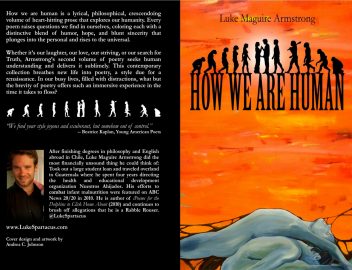What better way to start a new year than by reviewing HOW WE ARE HUMAN, a book of poems by Luke Maguire Armstrong. 
It found its way to my desk by chance. And I’m thankful it did. It’s what I love best about social media; it’s the happenstance, the meeting of like minds, the delight in finding strangers who inspire, not only by what they say but by showing us who they are.
Though I write poetry and love poems, they are not the first books I pick up or read. But when I do, I am transported beyond the borders of my mind.
Perhaps that’s why I was so intrigued by Luke’s introduction, in which he, too, admits to not gravitating to poetry as a reader. And yet he has the flair to weave words and paint pictures that resonate long after his book is closed.
In this book of wondrous poetry, the following poems stood out among many:
In Second Degree Luke Ashes, he made me think of my own demise, in a good way. I’m not young anymore and I keep putting off those end of life plans, but this poem made me think that without plans, you’re at the mercy of those who are left behind to do with you as they wish or do with you as they believe you would want.
The poem, Ode To An Anonymous Girl Across The Bar, expresses the longing of single men and women everywhere to find that one someone.
In Poetry of the Dead, he writes of a poet trying to get recognition…of dying without it. Here, the poet incorporates parts of poems his grandmother wrote.
“Mister-on-the-sidewalk,
save the stars for later;
we won’t have time to watch
them tonight.”
How They Were Human tackles the complexity of relationships. This poem is confusing, rambling, chaotic but perhaps that’s the point. It begs for another read.
In How To Begin and End, he writes about the promise of something everlasting, how fleeting it might be, but how to take the wonder of it and appreciate it for what it is, even though you move on from a relationship with –
“The lessons learned from each other’s edges.”
Happiness, the Pigeons and Us captures the height of marital strife amongst other things in a way that’s honest and alive, that speaks volumes of love and the cruelty that comes unbidden but comes nonetheless. The pain and beauty of love in all its colors.
In The Fractured Death of America, he tackles the myth of making it in America, the sacrifices illegal immigrants make, and America’s reaction to them. …the danger, the need…the tragedy on both sides of the border.
Somewhere Out There, Everyone Else imparts powerful thoughts that connect….in a universal way…He ponders on how no matter where we are or what we do, there is a sameness in the lives we lead. That’s not a bad thing, it just is.
“We all eventually discover what it’s like
to hold a hand and have every errant atom
of the body’s borrowed bones find everything
it never knew it needed between a sweaty squeeze.”
In Questions of Philosophy, the environmentalist in me loved the lines:
“If a tree falls in a forest into a power line
that starts a forest fire which burns down
the headquarters of an oil company
is there a god?”
To know more about the poet himself, his article To Cuba With Love, published in the online magazine Talking Writing speaks volumes. I heartily recommend you read it.
I could go on and on, but better still, there is nothing like reading the book yourself. By opening his pages, you’ll be introduced to the deep and insightful musings of a young poet who deserves to be read, and read again.





Thanks for this, Diana. I like “accessible” poetry, and this sounds great. It’s always nice to be introduced to a new writer and a new book!
You’re welcome. I was surprised that someone so young was able to communicate with such compassion and understanding, especially about relationships, death and “how we are human”.
I do love poetry. Sounds good!
Thank you, Diana for introducing me to this intriguing and talented man, who has already accomplished so much in his young life. I loved this thoroughly and wonderful review about a young poet and his work. Can’t wait to start reading Luke Maguire Armstrong’s poetry.
You’re welcome. Yes, Luke Maguire Armstrong is a poet with a soul.
Thanks Diana for doing this review and your great blog and everyone else for your kind feedback. I hope you check out the book and would love to hear your thoughts on it.
You are so welcome, Luke. Hope your work is going well.